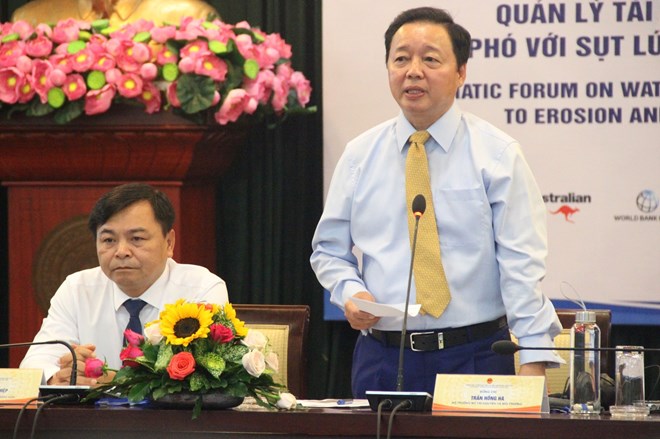A forum in Ho Chi Minh City on June 18 once again urged effective solutions to riverside and coastal erosion, land subsidence and saltwater intrusion, which are getting worse in the Mekong Delta.

Minister of Natural Resources and Environment Tran Hong Ha (standing)
speaks at the forum in Ho Chi Minh City on June 18 (Photo: VNA)
Minister of Natural Resources and Environment Tran Hong Ha said the Mekong Delta plays a critical role in national food security and economic development.
However, the delta is being influenced by the growing water exploitation of countries upstream Mekong River, along with the increasing population and growth pressure that has led to higher water demand and water pollution. Meanwhile, inappropriate infrastructure development has resulted in unprotected water sources and land subsidence.
Additionally, abnormal floods, more droughts, serious saltwater intrusion, widespread land subsidence, and riverside and coastal erosion have been recorded in almost all localities in the Mekong Delta as a result of climate change impacts, the official noted.
According to Director of the ministry’s Department of Water Resources Management Hoang Van Bay, as of the end of 2018, the Mekong Delta had 562 riverside and coastal erosion sites with the total length of 786km. Erosion occurs in not only the rainy season but also the dry season, from big river branches to canals, with growing seriousness.
He called for the designation of areas where groundwater exploitation must be restricted. Maps of subsiding areas and saltwater intrusion in the whole region should be drawn so that ministries and authorities will have the basis to take countermeasures.
It is also necessary to gradually reduce groundwater exploitation and build concentrated water supply systems which use surface water instead of groundwater, Bay added.
Tran Quang Hoai, Director General of the Vietnam Disaster Management Authority under the Ministry of Agriculture and Rural Development, said the Mekong Delta is usually strongly affected by saltwater intrusion in the dry season, which is also a natural rule. However, in recent years, the flow of water from the upper reaches of Mekong River to the Vietnamese region has changed due to the construction and operations of hydropower reservoirs upstream, breaking the saltwater intrusion rule and causing irrigation difficulties.
To address this issue, he suggested relevant agencies and authorities should improve the flooding and saltwater intrusion forecasting capacity, reinforce and increase anti-erosion and intrusion facilities like culverts, dams and embankments.
Pointing out the serious coastal erosion in Ca Mau, Chairman of the provincial People’s Committee Nguyen Tien Hai explained some solutions his province has carried out, including structural and non-structural measures.
He added embankments have been built to support the formation of alluvial grounds, helping to recover hundreds of hectares of coastal forest. Many businesses have also registered coastal tourism and commercial services projects in Ca Mau.
At the forum, participants also proposed some ideas to encourage private investment in coastal protection.